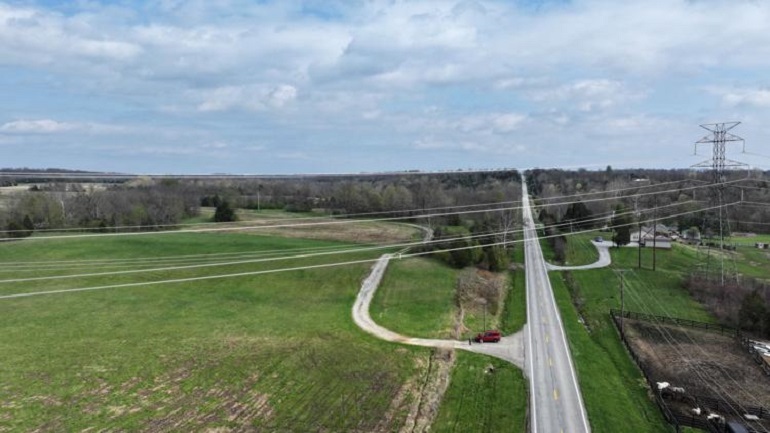LA GRANGE, Ky. — A proposed $6 billion data center in Oldham County has sparked significant backlash from local residents, who fear the industrial transformation of their scenic, rural landscape.
Tim Tipton, a local resident, is among the most vocal opponents of the plan, which would convert hundreds of acres of farmland into a sprawling campus for processing online data. The proposal, known as “Project Lincoln,” aims to build a massive data center complex in the heart of Oldham County. For Tipton, what is currently a peaceful view from his back deck — rolling farmland stretching into the horizon — could soon be replaced with looming warehouse-style buildings.
“I’m against data centers that are actively taking farmland and turning it into heavy industrial areas,” Tipton said. “It’s not just about the buildings; it’s about the kind of development that’s coming in and what it means for the area.”
Since the announcement of the project in late March, local opposition has grown. Tipton, who attended a public meeting held at Salt and Light Baptist Church on Friday, was one of over 230 residents expressing concerns about the proposed development. The meeting, which allowed residents to voice their worries, focused on various aspects of the project, including its environmental impact, potential strain on local infrastructure, and the secrecy surrounding the process.
At the meeting, Oldham County’s Judge-Executive David Voegele assured the audience that he was “very confident” that the Board of Adjustments and Appeals would reject the necessary land-use change that would allow the project to move forward. While Voegele emphasized his influence over the board’s makeup — he appoints all its members — he refrained from making any definitive statements about the outcome.
“I don’t think the board of adjustments will approve this. I certainly will urge them not to,” Voegele said. “But I won’t make the statement that the data center doesn’t belong anywhere in Oldham County.”
For many in attendance, the lack of transparency surrounding the proposal has been a major point of contention. Don Erler, a concerned resident, questioned the secrecy surrounding the deal. “Why so much secrecy? This doesn’t make any sense. Somebody is trying to pull a fast move that doesn’t fit into the neighborhood,” Erler said.
Others raised concerns about the fairness of a process that bypasses elected officials in favor of an appointed board. Questions were also raised about the economic projections for the project, which promises tens of millions of dollars in annual tax revenue for local government. Despite these claims, many residents are skeptical about the true benefits of the development, citing the long-term consequences of transforming the rural area into an industrial hub.
Data centers, which house vast amounts of tech equipment for companies like Microsoft, Amazon, and Google, are typically located in areas with ample infrastructure, such as reliable power supplies and high-speed internet access. Local leaders and residents have questioned whether Oldham County has the resources to support a project of this scale, particularly when it comes to power usage and traffic congestion.
The size and scope of the proposed development are also raising fears that this could be just the first in a series of data centers in the area. Historically, such facilities tend to cluster in certain regions, leading to rapid, transformative changes that are difficult to reverse.
While Voegele has expressed his opposition to the project in its current location, he acknowledged that data centers may still have a place in Oldham County, though he would prefer to see them developed in less disruptive areas. “I think there’s potential for economic development, but we need to think carefully about the long-term effects on our community,” Voegele said.
The debate over Project Lincoln highlights a broader challenge faced by rural communities across the country: balancing economic growth with the preservation of local character and resources. For many residents of Oldham County, the question is not whether data centers can bring jobs and tax revenue, but whether the costs — both environmental and cultural — are worth it.
As the proposal moves through the approval process, the community remains divided. With both local officials and residents voicing opposition, it remains to be seen whether the project will move forward or be blocked by the county’s Board of Adjustments and Appeals.
Despite the concerns, some local business leaders and proponents of economic development have expressed support for the project, emphasizing the potential job creation and tax revenue it could generate. However, for many rural residents like Tipton, the idea of turning farmland into industrial zones is a step too far.
As the debate continues, one thing is clear: Project Lincoln will have a lasting impact on Oldham County, regardless of the final decision.











